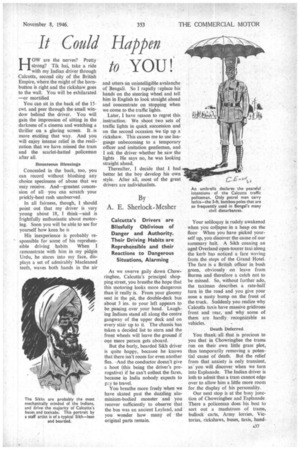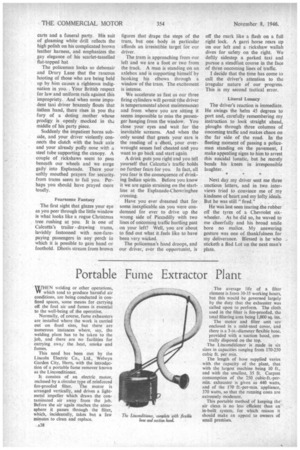It Could Happen
Page 39

Page 40

If you've noticed an error in this article please click here to report it so we can fix it.
to YOU!
By A. E. Sherlock-Mesher
HOW are the nerves? Pretty strong? Tik hai, take a ride with my Indian driver through Calcutta, second city of the British Empire, where the might of the hornbutton is right and the rickshaw goes to the wall. You will be exhilarated —or mortified You can sit in the back of the 15. cwt. and peer through the small window behind the driver. You will gain the impression of sitting in the darkness of a cinema and watching a thriller on a glaring screen. It . is more exciting that way. And you will enjoy intense relief in the realization that we have missed the tram and the scarlet-hatted policeman after all.
Bounteous Blessings
Concealed in the back, too, you can record without blushing any choice specimens of abuse that we may receive. And—greatest concession of all -you can scratch your prickly-heat rash unobserved.
In all fairness, though, 1 should point out that my driver is very youngabout 18, 1 think--and is frightfully enthusiastic about motoring. Soon you will be able to see for yourself how keen he is His inexperience is probably responsible for some of his reprehensible driving habits When I remonstrate with him in my pidgin Urdu, he stares into my face, displays a set of admirably Macleaned teeth, waves both hands in the air and utters an unintelligible avalanche of Bengali. So I rapidly replace his hands on the steering wheel and tell him in English to look straight ahead and concentrate on stopping when we come to the traffic lights.
Later, I have reason to regret this instruction. We shoot two sets of traffic lights in quick succession and on the second occasion we tip up a rickshaw. This causes me to use language unbecoming to a temporary officer and imitation gentleman, and I ask the driver whether he saw the lights He says no, he was looking straight ahead.
Thereafter, I decide that I had better let the boy develop his own style. After all, most of the great drivers are individualists.
As we swerve gaily down Chowringhee. Calcutta's principal shopping street, you breathe the hope that this motoring looks more dangerous than it really is. From your gloomy seat in the pit, the double-deck bus about 3 ins, to your left appears to be,passing over your head. Laughing Indians stand all along the centre gangway of the upper deck and on every stair up to it. The chassis has taken a decided list to stern and the front wheels will leave the ground if one more person gets aboard.
But the burly, bearded Sikh driver is quite happy, because he knows that there isn't room for even another flea. And the conductor doesn't give a hoot (this being the driver's prerogative) if he can't collect the fares, because in India nobody expects to pzy to travel.
You breathe more freely when we have skated past the dazzling aluminium-bodied monster and you recover sufficiently to observe that the bus was an ancient Leyland, and you wonder how many of the original parts remain. Your soliloquy is rudely awakened when you collapse in a heap on the floor When you have picked yourself up, you discover the cause of our summary halt. A Sikh coaxing an aged Overland open-tourer taxi along the kerb has noticed a fare waving from the steps of the Grand Hotel. The fare is a British officer in bush green, obviously on leave from Burma and therefore a catch not to be missed. So, without further ado, the taximan describes a rate-half turn in the road and you give your nose a nasty bump on the front of the truck. Suddenly you realize why Calcutta taxis have massive gridirons front and rear, and why some of them are hardly recognizable as vehicles.
Death Deferred You thank all that is precious to you that in Chowringliee the trams run on their own little grass plot, thus temporarily removing a potential cause of death. But the relief from that anxiety is only transient. as you will discover when we turn into Esplanade. The Indian driver is loth to admit that a tram cannot edge over to allow him a little more room for the display of his personality.
Our next stop is at the busy junction of Chowringhee and Esplanade There a policeman does his best to sort out a maelstrom of trams, bullock carts, Army lorries, Victorias, rickshaws, buses, taxis, hand carts and a funeral party. His suit of gleaming white drill reflects the high polish on his complicated brown leather harness, and emphasizes the gay elegance of his scarlet-tasselled flat-topped hat The policeman looks so debonair and Drury Lane that the raucous hooting of those who are being held up by him causes a righteous indignation in you. , Your British respect for law and uniform rails against this impropriety. And when some impudent taxi driver brazenly flouts that listless hand, there rises in you the fury of a doting mother whose prodigy is openly mocked in th,:, middle of his party piece.
Suddenly the impatient horns subside, and your driver violently connects the clutch with the back axle and your already puffy nose with a steel tube supporting the canopy. A couple of rickshaws seem to pass beneath our wheels and we surge gaily into Esplanade. There your softly mouthed prayers for securityfrom trams seem to fail you. Perhaps you should have prayed more loudly.
Fearsome Fantasy
The first sight that glazes your eye as you peer through the little window is what looks like a rogue Christmas tree rushing at you. It is one of Calcutta's trailer drawing trams, lavishly festooned with non-farepaying passengers in any perch in which it is possible to gain hand or foothold. Dhotis stream from brown figures that drape the steps of the tram, but one body in particular affords an irresistible target for our driver.
The tram is approaching from our left and we are a foot or two from the track. A man is standing on an axlebox and is supporting himself by hcoking his elbows through a window of the tram. The excitement is intense.
We accelerate as fast as our three firing cylinders will permit (the driver is temperamental about maintenance) and from where you are sitting it seems impossible to miss the passenger hanging from the window. You close your eyes and wait for the inevitable screams. And when the only sound that greets your ears is the rending of a dhoti, your overwrought senses feel cheated and you want to go back and start again.
A drink puts you right and you tell yourself that Calcutta's traffic holds no further fears for you. In fact, all you fear is the consequence of drinking Indian spirits. Before you know it we are again straining on the startline at the Esplanade-Chowringhee crossing.
Have you ever dreamed that for some inexplicable sin you were condemned for ever to drive up the wrong side of Piccadilly with two lines of oncoming traffic hurtling past on your left? Well, you are about to find out what it feels like to have been very wicked.
The policeman's hand droops, and our driver, ever the opportunist, is
off the mark like a flash on a full right lock. A garri horse rears up on our left and a rickshaw wallah dives for safety on the right. We deftly sidestep a parked taxi and pursue a steadfast course in the face of three oncoming lines of traffic.
I decide that the time has come to call the driver's attention to the irregular nature of our progress. This is my second tactical error.
Literal Lunacy
The driver's reaction is immediate. He swings the helm 45 degrees to port and, carefully remembering my instruction to look straight ahead, ploughs through three columns of oncoming traffic and makes chaos on the far side of the road. In the fleeting moment of passing a policeman standing on the pavement, I make appealing signs to him to arrest this suicidal lunatic, but he merely bends his knees in irresponsible laughter.
Next day my driver sent me three unctious letters, and in two interviews tried to convince me of my kindness of heart and my lofty ideals. But he was still "fired."
He was last seen tearing the rubber off the tyres of a Chevrolet sixwheeler. As he did so, he waved to me cheerfully and his broad smile bore no malice. My answering gesture was one of thankfulness for my deliverance. Blessed is he who sticketh a Bad Lot on the next man's plate.




































































